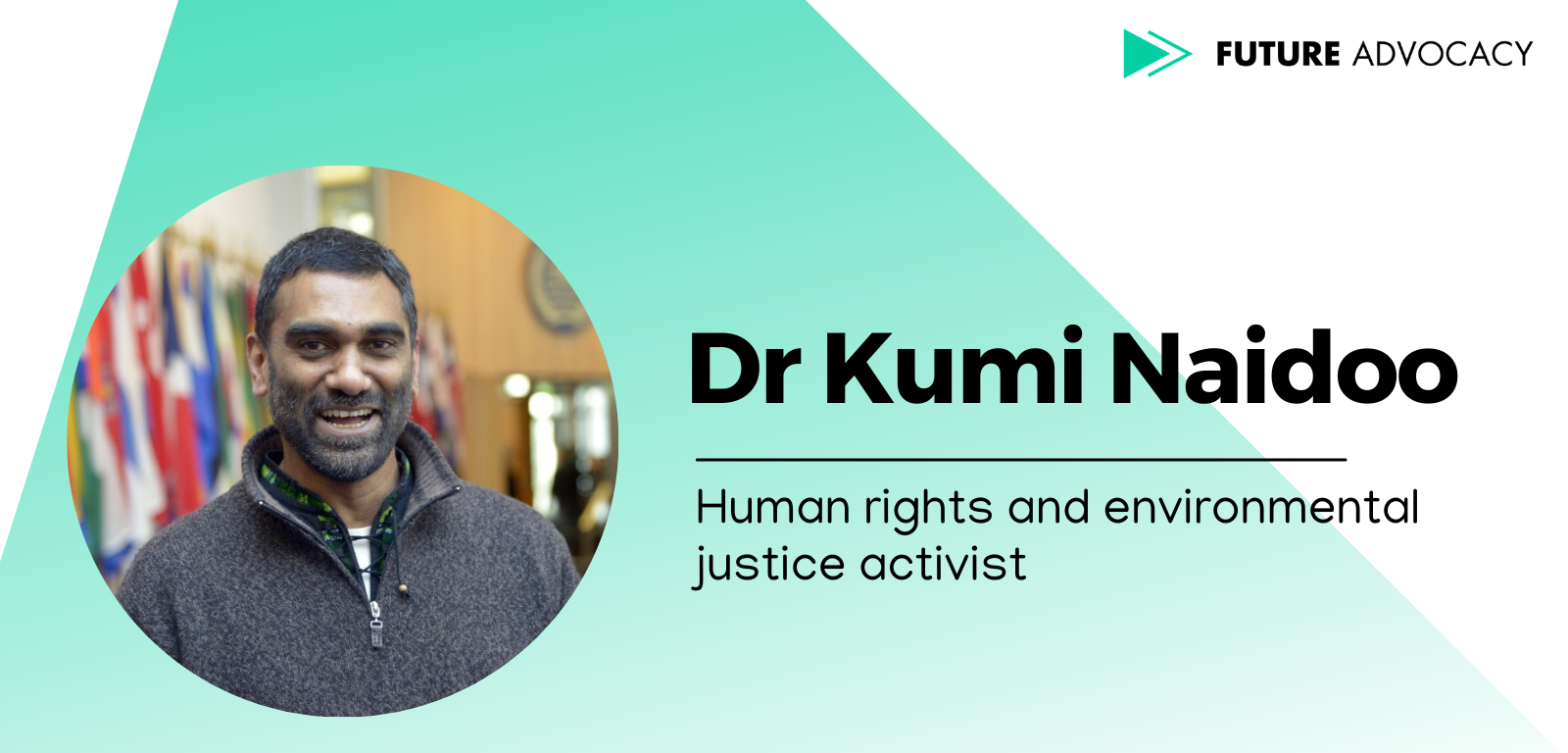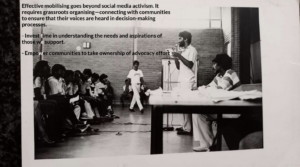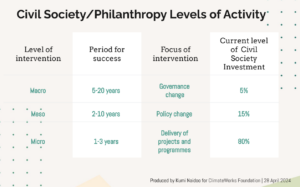
By Iona Cable
At Future Advocacy, we believe firmly in admitting when things don’t go right, and learning from our experiences and the experiences of others. It was a powerful moment when, as part of an advocacy training we’re running for WaterAid, we had a keynote speech from Dr Kumi Naidoo. He talked honestly and openly about his lifetime as an activist, from organising school boycotts against the apartheid regime, campaigning for the legalisation of the African National Congress, to heading up Greenpeace and Amnesty International. Given Kumi’s extraordinary journey, I was extremely impressed by his humility and willingness to reflect on what went wrong as well as the big successes. Kumi’s speech was an injection of optimism and inspiration and we wanted to share our key takeaways:
- For me the most memorable thing Kumi told us is that “Pessimism is a luxury we simply cannot afford”. It’s a challenging time for a lot of advocates across the world. But that’s why impactful advocacy, rooted in hope that things can get better, is so critical.
- Don’t mistake access for influence: “If I’m brutally honest most international NGOs get this wrong, and I got this wrong in many of my roles.” Kumi talked about his experience across his career of meeting politicians – they know what we’re going to say, we know what they’re going to say, we have our meeting, we each tick the box of having met, and the needle of change doesn’t move. It becomes a ritualistic exercise. “The most effective advocacy I’ve done is when I’ve been in a meeting and the person has understood there is a serious, powerful constituency of mobilised people behind me.”
- Speak the language of ordinary people: Advocates need to understand better how ordinary people speak. Too often we use jargon and acronyms that make no sense outside of the policy bubbles we exist in. Kumi encouraged the WaterAid advocates to translate their language into ‘Trump speak’ – “while you might tell people “X number of people don’t have access to adequate sanitation”, Donald Trump would say “X number of people don’t have anywhere to shit and piss.” And he reflected on the language of his own campaigning – Kumi told us that after a Greenpeace campaign that he’d worked on, where he brought a sign saying “Stop Arctic Destruction” to occupy an oil rig, one member of his family said “Uncle Kumi, what a stupid slogan. A better slogan would have been ‘Save Santa Claus Now’”. Speak to people’s heart, body and soul, not only their brain.
- Mobilise people: To tackle the key challenges of today, we need to mobilise the largest level of participation possible – those in power are never going to react as fast as we need them to unless they see that public opinion is behind us. Make sure the messages you’re bringing to decision makers reflect the messages of those who are impacted by the issue. Kumi reflected that one of the biggest mistakes we all make is underestimating the power of people. Because the starting point of people working on social justice is often that people are marginalised, excluded and oppressed, we forget the many pathways that people can participate in to fight for global justice.

- Promote global solidarity: Build alliances across borders. Working nationally and locally is important, but when decisions are being made at the global level, we need to be powerful and advocate at the global level too. He pushed back against the phrase ‘think globally, act locally’ to say “We don’t have a choice whether we work globally, nationally, provincially or locally. Depending on the position we find ourselves in and where the power dynamics are, we need to decide on where we put our energies.”
- Challenge dominant narratives: Dominant narratives have led to an unequal shaping of how we understand history, which is dominated by the Global North and overlooks the experiences and needs of the Global Majority. An example Kumi gave from working in global campaigns was references from the Global North to “the summer campaign” and thinking “Ah, when you’re saying summer, you mean YOUR summer.” The language we use is based on certain assumptions. Advocates need to be aware of this and make sure the dominant assumptions are challenged, and we’re not reinforcing the status quo.
- Drive local policy change: All politics is local. Kumi received some criticism once saying “Kumi seems a nice enough guy, but he’s got his gaze wrong. He’s looking to people with power and appealing for them to do the right thing. His gaze needs to be more to the powerless – he needs to make sure that the organised presence of the powerless is felt in every meeting that he goes to.” If our gaze is always focused on those in power, we’ll lose connection with the experience of the majority of people. Our advocacy should reflect what’s being said and the needs at the local level.
- Make use of effective tools: Technology is developing all the time, and the digital landscape has completely changed. Kumi said “I remember being so excited one day in the 90s discovering that you can send 10 faxes to 10 media at the same time. It was such an achievement.” Take the time to learn about new tools that are available for campaigners – because your opponents definitely are.
(shameless plug! If you’re interested in participating in our training ‘Using AI for full spectrum advocacy and campaigns’ email florenciaedgina@futureadvocacy.org)
- Don’t just treat symptoms of problems: Try and understand the root cause of the problem and work from there. Governance and policy change is what will create enduring change.

- Pace yourself and make advocacy joyful: If you want to make meaningful, lasting change throughout your career then pace yourself, and be wary of the symptoms of burnout in yourself and those around you. Make advocacy fun, creative, and hopeful. This is how you will mobilise people and bring them along with you.
Dr Kumi Naidoo is a South African human rights and environmental justice activist. Kumi began his activism journey organising school boycotts against the apartheid educational system in South Africa that led to a mass mobilisation against the apartheid regime. He later played a pivotal role in the legalisation of the political party the African National Congress.
He has since gone on to become Secretary General of CIVICUS, chairperson of the Global Call to Action Against Poverty, Executive Director of Greenpeace, and the Secretary General of Amnesty International. He is currently President of the Fossil Fuel Non-Proliferation Treaty Initiative and Co-Founder of the Riky Rick Foundation for the Promotion of Artivism.